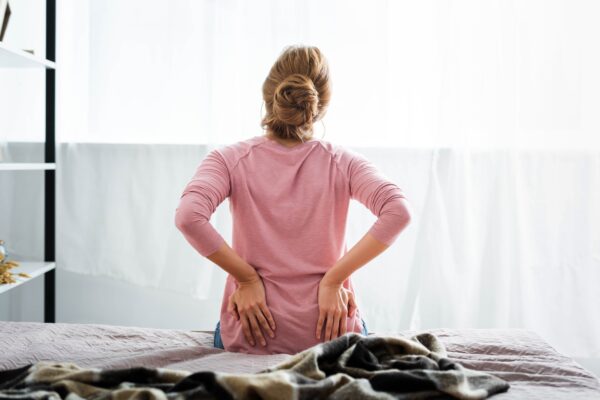What is Back Pain?
Back pain is a common condition that affects around 60% of the UK population at some time in their lives. This condition can range from constant back ache to a shooting, sharp pain. Most back pain improves within a few weeks but often can take longer.
What Causes Back Pain?

Back pain causes are very varied, and many people experience backache and pain at some point. In many cases, back pain isn’t serious and has no underlying cause, however, it is often assumed to be a musculoskeletal problem due to dysfunction or injury to the spine or supporting muscles. It is always important to have back pain assessed by an appropriately trained healthcare professional as some cases of back pain may represent more serious underlying health conditions. Below are some of the more common causes:
Lower back pain causes:
- Injury or disorder of spinal joints, vertebrae, or soft tissues
- Prolapse of intervertebral discs
- Arthritis of the spinal joints
- Spinal fracture
- Cancer
- Infection
- Kidney stones or infection
- Abdominal aortic aneurysm
- Endometriosis
Upper back pain causes:
- Injury or disorder of spinal joints, vertebrae or soft tissues
- Prolapse of intervertebral discs
- Shingles
- Spinal fracture
- Cancer
- Infection
- Thoracic aortic aneurysm
What are Back Pain Symptoms?
Back pain can be experienced in one specific area or all over the back, but the pain can also move to other body parts such as your legs. The most common symptoms of back pain include:
- High levels of pain when lifting or bending
- Pain that feels worse when sitting or standing
- Pain in the back which comes and goes
- Feeling stiff when you wake up or after being stood/sat still for long periods.
If you experience these more serious symptoms of back pain, it is important to seek urgent medical advice:
- Difficulty passing urine
- Loss of bowel control
- Numbness or tingling around the genitals or buttocks
- Weakness in the legs or arms
- Severe pain which prevents sleep
- Tenderness over the spine
- Unexplained weight loss, fevers, or chills
Types of Back Pain

There can be different types of back pain, from less severe, short-term pain, to more severe and intense pain.
- Acute back pain – sudden and lasts a few days.
- Subacute back pain – sudden and can last up to 12 weeks
- Chronic back pain – can happen quickly or slowly and lasts longer than 12 weeks, occuring most days.
Diagnosing Back Pain
Back pain can sometimes be hard to diagnose. A doctor will perform a physical exam and ask questions – this includes examining the spine and posture to look for changes in structure. Depending on the symptoms it may also be necessary to perform a neurological examination.
It will not always be necessary to have additional tests, but according to the individual it might be helpful to perform blood tests, X-rays, or more specialist imaging.
Back Pain Treatment
Exercise and staying active is vital to helping relieve back pain. Lack of movement can cause stiffness and worsen pain in the long-term, therefore keeping active and moving regularly can help speed up recovery. It is important to always do this within the limitations of the condition, and therefore consulting a trained health professional on type of intensity of exercise is advisable. Other types of treatment include:
- Physiotherapy can help improve strength and flexibility, improving pain over time.
- Psychological therapy, including cognitive behavioural therapy, can help people cope with the pain and engage with pain management in a positive way
- Other ways of reducing back pain are daily exercise, over the counter pain relief, anti-inflammatory creams or gels, maintain good posture.
Medication for Back Pain
The recommended medication for back pain depends on the type of condition.
Acute back pain can often be managed using over the counter pain relief overseen by a trained health professional, these include non-steroidal anti-inflammatory drugs (NSAIDs), weak opioids, and heat rubs or patches that contain salicylates. However, for chronic back pain opioids, gabapentinoids, antiepileptic drugs and antidepressants aren’t recommended to be prescribed by GPs, and therefore some individuals may be referred to specialist pain services to oversee the most appropriate treatments for their care.
Back Pain and Medicinal Cannabis
Research into the effect of medicinal cannabis on back pain is limited. However, following the legalisation of cannabis for medical purposes in 2018, there has been a rise in people looking towards medical cannabis. When first-line therapies have not proved effective at reducing symptoms, medical cannabis may be considered an option for chronic back pain.
For further information and to find out more about medical cannabis, click here to discover more about our award-winning Curaleaf Access Scheme. Alternatively, complete an eligibility assessment now. Once complete, one of our clinicians will review your application and advise whether you are eligible for progression to an appointment.

